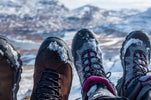
Are Hiking Boots Good for Snow?
, by Ed Stone , 5 min reading time

, by Ed Stone , 5 min reading time
But when winter rolls in or you’re visiting a colder climate, you may find yourself wondering, are hiking boots good for snow?
Essentially, the answer is yes—depending on the boot in question. If you want to wear your hiking boots in the snow, they need to excel in a few departments. Keep reading for what you should know.
Two qualities a pair of snow-suitable hiking boots must have are traction and insulation. Snow is slick, slippery, and wet. It’s also freezing cold. That means that snow-appropriate footwear needs to work hard to keep you upright and your feet warm.
Not all hiking boots are designed with snowy terrains in mind. That said, you can still find hiking boots with sufficient grip and grit to keep you from slipping and sliding on deep snow and ice. For the most aggressive traction, look for boots that feature the following:1
Proper insulation is essential if you want to keep your feet, toes, and ankles warm while you’re trudging through the snow. Fortunately, most boot brands rate the insulation level of the boots they manufacture to give you a sense of the kinds of temperatures they’re prepared to handle.
However, it’s important to understand exactly what those ratings mean and how accurate they are.
Hiking boot insulation is rated according to the thickness of the insulation in grams, from 100g to 800g, though the scale skips the 300, 500, and 700g increments.2 In general, boots rated at 100g and 200g are suitable for mild winter conditions with very little snow. They’re also best if you only spend a short amount of time outside.
For colder temperatures, heavier snowfall, and longer outdoor periods, you should opt for boots that feature the following ratings:2
Even in warm weather, wet feet can make a mess of the best hikes. In the winter, however, snow-logged boots aren’t just squishy and uncomfortable. They can also make your feet colder and expose you to related dangers.
Are waterproof hiking boots good for snow? Yes, and the good news is that many hiking boots offer some degree of waterproofing thanks to a layer of special waterproof material that’s installed under the winter hiking boot’s outer shell.3 For the most thorough moisture protection, look for winter trekking boots that feature waterproofing material throughout the design, including the boot uppers.
Waterproofing is important, but be sure your hiking boots are also breathable. Yes, you want winter hiking boots that keep moisture on the outside. But you also want them to have adequate air circulation to enhance the drying time when snow does seep in.
The final two qualities that your hiking boots need to offer if you plan to wear them in the deep snow are the same two that matter wherever you wear them: comfort and support.
Finding a comfortable pair of hiking boots begins with selecting the right size. Avoiding winter boots that are too big or too small protects your feet from blisters, rubbing, and other aggravations that can cause pain or even discomfort. To ensure you get the winter hiking boot that’s right for your foot, keep the following pointers in mind:4But are hiking boots good for snow when it comes to supporting your feet? Generally speaking, if your hiking boots are supportive in warm conditions, they should be suitably supportive in the snow—especially if they’re reinforced with snow-ready traction. If your winter boots are walking into snowy conditions, be sure that they excel in the following regards:5
If you’re in the market for a pair of hiking boots you can wear in any type of weather, look no further than Boot World. We offer a range of snow boots for men and women—from all-weather hiking boots to CAT work boots, whether you’re working or playing in the snow, sun, or any weather condition.
If you need winter hiking boots, you need Boot World. Shop today.
Ed Stone brings over 45 years of footwear knowledge and passion to his role as President of Boot World, a family-owned company and an industry leader in safety and occupational footwear. A second generation "shoe dog” Ed's footwear knowledge is unparalleled, serving as an informal advisor for some of the worlds largest footwear brands including Wolverine, Timberland PRO, and Reebok Works.
A lifelong Southern California resident, and ardent conservationist, Ed enjoys hiking and open water swimming.